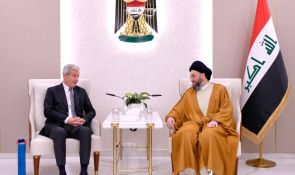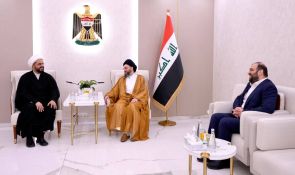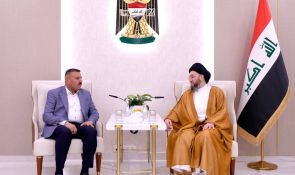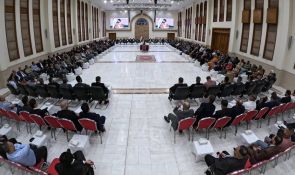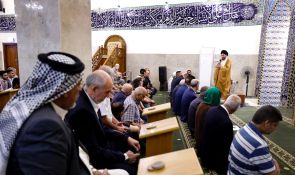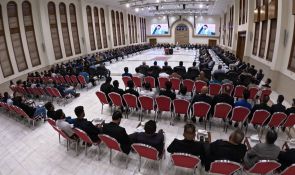SAYYID AMMAR AL-HAKIM: “The State that serves its people and pleases its general citizenry will win success.”
Our talk was about the Islamic theory of leadership and administration. We stated that the covenant of the Commander of the Faithful (Ú) to Malik al-Ashtar, when he installed him as provincial governor of Egypt, represents a summary of this theory. In this important historic document, the Commander of the Faithful (Ú) was able to create and summarize everything an official should be familiar with, and everything to which a leader should be committed. The nation and the subjects must cooperate with him in order to achieve success for the leadership network. The Commander of the Faithful (Ú) was able in this covenant to sum-up this integrated vision, what the duties and rights of an official are on one hand, and what they are for the nation and people on the other. We talked about six parts, and we moved to the seventh part of this covenant where the Commander of the Faithful (Ú) focuses on the success of the leadership network as originating from the public being pleased, the general public of whom an official takes charge. We said that the leadership network is not restricted to the ministers, governors and senior officials. The leadership network extends to include all areas in charge, starting from the head of a plant, a company, an activity, an organization, a guild or such different affairs and reaching the family where there is someone administering it. The area of the leadership command becomes narrower and broader but the conditions, descriptions and criteria do not differ among these networks; rather, it is a frame put by the Commander of the Faithful (Ú) through which he expresses the Islamic vision in this framework.
Winning the pleasure of the general public..
The seventh part is where the Commander of the Faithful (Ú) focuses on the importance of winning the public’s pleasure. All people in the areas of responsibility should be pleased. The pleasure of the aristocratic and elite class is linked to a group of special privileges at the expense of the general public. The Commander of the Faithful (Ú) expresses Islam’s vision that what is important is to win the pleasure of the general public. If you win the public, the elite groups will have to cope and show respect. If you disagree with the general public, no matter how the elite group is pleased, there is no justification for the continuation of the administration of that particular network. The Commander of the Faithful (Ú) starts this important part by saying, “Let what you love the most be their middle grounds when it comes to what is right, the most general with regard to justice and the most general in pleasing the subjects.” The Commander of the Faithful (Ú) states three basic principles through which the pleasure of the general public is achieved and not that of the elite ones only.
Middle Grounds in Righteousness
The middle grounds in righteousness is to apply the law, commit to the procedures, not going to extremes or taking things lightly. Excessive pressures lead to people not being able to fulfill these commitments, thus they fall into violating the law. Also, leniency leads to looseness, to undermining the leadership network, and nobody will adhere to the law. The middle grounds in righteousness, in commitments, is the first principle about which the Commander of the Faithful (Ú) talks.
Justice must be Inclusive, not Discriminatory
The second principle is more general when it comes to justice. Justice must include everyone without discrimination, without distinguishing between one person and another in the leadership network. The concepts of integrity and of fighting corruption must include everyone. The law must hold everyone accountable without discrimination or distinction in the plans, projects, positions, measures and procedures. There must be a status of parity as the Commander of the Faithful (Ú) states. When justice includes everyone, all will feel pleased even if one may lose something here or there, but he gains in other areas.
Islamic Principle Means Pleasing the Widest Spectrum of People
We have reached the third principle: “… and the most inclusive of the subjects”; a position, the policies, plans, projects…, etc. must absorb the widest spectrum of the public’s pleasure. Ali (Ú) does not talk about pleasing everyone because winning everyone’s pleasure is an unattainable goal no matter how much one offers. The prophets, their successors and reformers, when the chances for reform were there, could not please all people at all. There is always someone who objects. This is normal because people are many kinds. Some of them are opportunists, some have ambitions, some have a unilateral outlook at matters: He is not satisfied unless he gets something, and so on. Therefore, the Islamic principle is to please the widest area of the public and not necessarily achieve full consensus on a position of command and about who is in charge. So, according to Ali’s way, according to the genuine ideology of Islam, the people are the owners of the State, and the State must serve the public, must address their demands to tackle their problems and crises, familiar with their concerns. The State that serves its people and achieves the pleasure of its general citizenry is the one that can win success. But the State about which people are not pleased cannot score success. It procrastinates and falls into injustice as we pointed out in past places while discussing this sacred covenant of the Commander of the Faithful (Ú).
The People are the Rulers, the Owners, the Decision-Makers… Such is Ali’s program in addressing this issue of responsibility…
In a narrative on p. 7, Vol. 32 of Bihar al-Anwar, we are told that when Othman was killed, people went to Ali (Ú), crowding around him asking to swear allegiance to him as he kept refusing saying, “Leave me alone and seek someone else.” Ali refused. Was he reluctant to serve the public, or was he reluctant to take charge? Was it a flight from the march? Was it reluctance to serve? Far it is from the Commander of the Faithful (Ú) to apply these things to him. Now senior companions of the Prophet (Õ) were saying, “O Ali! You are for it!” Ali (Ú) refused because he saw that the conditions for success were not there. There were movements in the nation that had their own interests and goals, everyone wanted Ali (Ú) to be the caliph because of an interest, an ambition, of his own. We here do not talk about everyone but about those who wanted to place him in command after Othman, while the Commander of the Faithful (Ú) knew that those folks were opportunists who would not let him work hard and succeed, will not let him work in the right way which Allah Almighty accepts… When matters become serious, and when he adopts the sound decisions, problems and disruptions start by those folks. When the chances for success are not there, there is no gain in ruling, there will be no favoritism and concessions. Governing is a responsibility, a trust, as Ali (Ú) stated in previous parts. He says, “Leave me alone and seek someone else,” i.e., “I do not want this authority with such conditions which do not lead to success in this sacred mission.” “We are approaching a matter that has its aspects… We are entering the arena of confusions, and your personal opinions will vary. You cannot cope with the right vision of the plan. Look for the person whom you can direct as you please.”
“We are approaching a matter that has its aspects,” that is, confusing issues, those about which minds will not settle. Ali (Ú) moves according to constants and principles. As for others, their principles are linked to their own interests; therefore, their minds will vary; their views about these interests will vary from one status to another. “The hearts will not be set on it,” that is, the sentiments and feelings will not be in complete harmony with the program which Ali (Ú) will be presenting, which is the program of righteousness. What is right is what is fair. What is right is giving the opportunity to you once and to someone else another. Sentiments vary when the criteria are right. They said, “We plead to you in the Name of Allah.” Do you not see what took place in Islam. Islam’s image became blur, distorted. People did not know what is right, what the law is, what is right and what is wrong, everyone asking for things for himself. “Do you not fear Allah?”, that is, “O Ali! You are the Commander of the Faithful, do you not fear lest Allah should leave us in these difficult conditions?” Those folks thought that Ali was seeking excuses, taking advantage of the situation and of the absence of an alternative so that he could raise the ceiling of his conditions and get more concessions!! He said: I have answered you not to run away from a national duty, but what I see in you makes me believe that my way of administration will not avail with you. You will not adhere to it, and we may differ. “Be informed that if I respond to you, the result will be what I already know: I will not be able to tread a path that agrees with your wishes and desires. When I become caliph of the Muslims, I shall apply the Islamic criteria, restrictions and terms in your regard. I am sitting at home and I shall provide advice to the next caliph just as I did to the previous caliphs. I give advice and guidance, but keep me away from caliphate because I work only according to the sound Islamic principles which may not be in harmony with your ambitions and desires. I, Ali, do what is right, what is fair, fearing no blame when it comes to obeying Allah.” If you leave me alone, I will be like any of you. “I will not give you orders but leave the field to you. I do not wish to become weak or to be a stumbling stone. If you do not vest responsibility on my shoulders, I am like any of you and no more.” “Rather, I will be more than any of you, hearing and obeying.” Ali does not bargain. He does not flatter anyone, either. According to Ali, ruling the Muslims means solving a problem, taking matters back to the way they should be. It is a program, a principle, a doctrine, a framework. He looks for his role in serving the people provided they adhere to the true Islamic criteria.
Ali (Ú) favors nobody save according to what is right…
“Rather, I will be more than any of you, hearing and obeying of whoever you place in charge of your affairs.” If you hand the banner to you, I have constants; nobody enjoys any particular status except when it comes to what is right. Responsibility is what moves Ali. The Shari’a-mandated positions are the ones that move Ali (Ú). They said, “We shall not leave you before swearing the oath of allegiance to you.” After having informed them of all these terms and placed them under the reality, examining their affairs, he received their response: “We accept whatever you say, and we swear the oath of allegiance to you, O Ali!” Here, the argument is perfected when he frankly informed them of his method and way of administration and leadership. “If it is a must thing, it has to be done at the Mosque [of the Prophet].” You are the elite, the negotiators, the political blocs, and you have agreed. But what is important is that people must say their word at the Mosque and not behind closed doors, whether they will elect or not. What do people say at the Mosque? What is the opinion of the public, of the citizens? “… for my allegiance shall not be in secret; it will be only out of the pleasure of the Muslims, in public, before all.” Most Muslims agree. Is there a supportive public opinion? If so, I am here. If there is no consensus opinion, there will be no success. He stood up as people surrounded him. He entered the Mosque. Muslims overwhelmed him, swearing the oath of allegiance to him. The Muslims who crowded around him swore the oath of allegiance to him. Such is Ali’s program, that is, the procedures and restrictions placed by the Commander of the Faithful for the success of the leadership network. From Day One, he (Ú) made people realize that they were the foundation, the base, a reference to the elite groups, if the people have concessions and deals for them. He referred to the public, placing them in charge of the matter. The nation is the basis. The nation rules. It is the Owner, the decision-maker, such is the program which Ali (Ú) put in place for his actions.
The Marji’iyya backs the public in making choices; it stands at the same distance from all patriotic forces…
Notice what Ali (Ú) says somewhere else. He says, “This is your command (that is, governing, because the people are the ones who rule, they own and they administer); nobody has the right in it save what you command.” Such is the way of our great religious authorities who supported the elections and, after matters settled, were the first to call for an open slate. Why did they do that? The Marji’iyya (highest religious authority) said that the closed slate would make each party bring its own group regardless of the public’s opinion. So, people would vote without seeing where their polls go. As for the open slate, the voting in it is for those whom people want, and these people bear the responsibility for their choice. When the slate became thus open, no fair person can now blame the Marji’iyya because the choice was given to the public: The Marji’iyya did not issue directions except to enjoin people to vote. Casting ballots means bearing responsibility. It means you enjoy your right. As regarding whom you elect, the Marji’iyya does not tell you what to do; the matter is up to you, up to your choice. Actually, some people may have expressed amazement about the Marji’iyya standing at the same distance from everyone so it would clear its conscience before Allah, history and the people. And it may have had in mind who was near and who was distant. This is possible. Everyone has his own evaluations, and the Marji’iyya is no exception with regard to this principle. If a religious authority has principles and values, his evaluations will be based on values, principles and constants, but he stood at the same distance so everyone would bear his responsibility. Nowadays, nobody can remonstrate with the Marji’iyya about anything. If there is an achievement earned, it belongs to us and to the Marji’iyya because it called for the elections, encouraging people to vote, and it is to be thanked for every achievement. But if we make the wrong choice, the good contribution of the Marji’iyya versus our bad option is weighed against us, while the Marji’iyya does not bear any burden for it. At any rate, such is the principle which Ali (Ú) puts in place in dealing with the public, in undertaking a position of responsibility.


